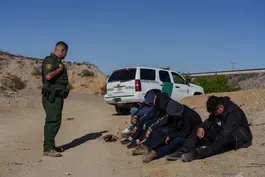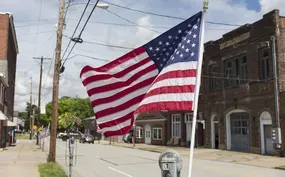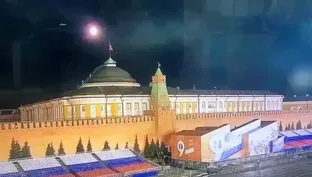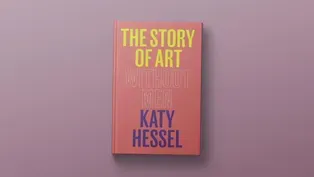
Fed raises rates, signals future pause amid uncertainty
Clip: 5/3/2023 | 5m 17sVideo has Closed Captions
Fed raises rates again but signals a future pause amid banking sector uncertainty
The Federal Reserve raised interest rates again, its tenth consecutive hike, this time by a quarter of a point. But Chairman Jay Powell also suggested the Fed may pause future hikes if the economy continues to cool. He cited the state of the job market as to why he's optimistic the rate increases won't tip the economy into a recession. Amna Nawaz discussed the latest with David Wessel.
Problems with Closed Captions? Closed Captioning Feedback
Problems with Closed Captions? Closed Captioning Feedback
Major corporate funding for the PBS News Hour is provided by BDO, BNSF, Consumer Cellular, American Cruise Lines, and Raymond James. Funding for the PBS NewsHour Weekend is provided by...

Fed raises rates, signals future pause amid uncertainty
Clip: 5/3/2023 | 5m 17sVideo has Closed Captions
The Federal Reserve raised interest rates again, its tenth consecutive hike, this time by a quarter of a point. But Chairman Jay Powell also suggested the Fed may pause future hikes if the economy continues to cool. He cited the state of the job market as to why he's optimistic the rate increases won't tip the economy into a recession. Amna Nawaz discussed the latest with David Wessel.
Problems with Closed Captions? Closed Captioning Feedback
How to Watch PBS News Hour
PBS News Hour is available to stream on pbs.org and the free PBS App, available on iPhone, Apple TV, Android TV, Android smartphones, Amazon Fire TV, Amazon Fire Tablet, Roku, Samsung Smart TV, and Vizio.
Providing Support for PBS.org
Learn Moreabout PBS online sponsorshipAMNA NAWAZ: Welcome to the "NewsHour."
The Federal Reserve raised interest rates again today, its 10th consecutive hike, this time by a quarter-of-a-point.
But Chairman Jay Powell also suggested the Fed may pause future hikes if the economy continues to cool.
During a press conference, Powell was asked why he remained optimistic that the ongoing rate increases wouldn't tip the economy into a recession.
He cited the state of the job market.
JEROME POWELL, Federal Reserve Chairman: It wasn't supposed to be possible for job openings to decline by as much as they have declined without unemployment going up.
Well, that's what we have seen.
So we -- there are no promises in this, but it just seems that -- to me that it's possible that we can continue to have a cooling in the labor market without having the big increases in unemployment that have gone with many prior episodes.
Now, that would be against history.
AMNA NAWAZ: To help us sort through this thinking and the Fed's approach, I'm joined by David Wessel.
He's director of the Hutchins Center on Fiscal and Monetary Policy at the Brookings Institution.
David, good to see you.
DAVID WESSEL, Brookings Institution: Good to be with you.
AMNA NAWAZ: So, Powell was asked why this increase when the economy does seem to be cooling.
What's the thinking here?
DAVID WESSEL: Basically, Jay Powell is determined not to let inflation continue to be at these levels.
Jay Powell idolizes Paul Volcker, the Fed chair who famously broke the back of inflation, and he is willing to take a recession, if that's what it takes to bring inflation down to their target.
And what was interesting was he admitted that the Fed staff thinks we're going to have a recession, 400 Ph.D. economists.
He just happens to disagree.
AMNA NAWAZ: So, this is their 10th straight hike, right?
It's the fastest series of rate increases since the 1980s.
Inflation has begun to moderate, but it's still above that 2 percent goal that they want to hit, right?
So are we going to see more increases ahead?
DAVID WESSEL: We don't know.
AMNA NAWAZ: OK. DAVID WESSEL: He signaled that they're -- they may -- this may be the last one for a while, but he didn't commit.
And he says it depends on a couple of things.
One is, of course, the incoming data.
Does inflation cool off or not?
And, secondly, they're focused on how much banks are going to be reluctant to lend as a result of the recent banking crisis.
And if they see a lot of that, then they may not raise rates again at their June meeting.
AMNA NAWAZ: Inflation has been stubbornly high for two years now.
When you look at this particular economy, where we have seen persistent price increases in particular, help us understand why it's been so hard to stamp out right now.
DAVID WESSEL: Well, we get inflation in large part when demand grows faster than the capacity of the economy to meet that demand.
And demand has remained very strong.
Consumer spending has been pretty strong, partly because a lot of people have jobs.
And a lot of companies have raised prices because they can and let their profit margins get bigger.
And we're not quite done with the supply chain problems that were -- marked the COVID recession -- I mean, the COVID episode.
But it is a surprise that inflation has been so stubborn.
And that's why the Fed has been so aggressive in raising rates.
AMNA NAWAZ: Why do you think Powell is so optimistic that he can avoid a recession right now?
DAVID WESSEL: Because I think he knows that if he said we're going to have a recession, everybody would panic, and we would definitely have one.
So, I believe that he hopes that we won't have a recession.
But I don't believe that, in his heart of hearts, he thinks that's likely.
AMNA NAWAZ: There's a couple of other economic challenges we have to figure into.
You mentioned three bank failures in recent months.
They obviously have broader concerns about the fiscal sector right now.
How does that complicate the Fed's efforts moving forward?
DAVID WESSEL: The Fed knows that, if it raises interest rates, it gets more expensive for people to borrow, they spend less money, you get less demand in the economy, and that should bring down inflation.
That's what the textbook says.
Suddenly, they have another factor.
How much are bankers going to pull in their horns?
How much are bankers going to raise the standards for lending?
How much of a credit crunch are we going to have?
And Jay Powell has made clear that a credit crunch is sort of like a rate increase.
The bigger the credit crunch, the less they have to raise rates.
So they're watching very carefully to see not these three banks, because they're taken care of, but what do the rest of the banks do?
It's particularly serious for small and medium-sized businesses, which depend on these regional banks that are getting more stingy.
AMNA NAWAZ: Finally, David, as you know, here in Washington, there is a showdown over raising the debt limit, creating a lot of uncertainty.
Could lead to turmoil, even if we do not default.
How could that impact future Fed action?
DAVID WESSEL: I think, if you're at the Fed, and you're looking towards a meeting in mid-June, you say, we're not going to raise rates if we're in the middle of a debt ceiling crisis.
So I think it may be the reason that this is the last rate increase for a while.
AMNA NAWAZ: Finally, if you pull it back for us, how should everyday consumers look at all of this data and information coming in right now?
DAVID WESSEL: I think that one thing that Jay Powell made clear today is that we're not going to see rate cuts anytime soon.
And the financial markets have been expecting rate cuts.
So I would not make any plans on expectations that the Fed is going to be cutting rates before the end of the year.
AMNA NAWAZ: We will wait.
We will watch.
We welcome you back when we have more information.
DAVID WESSEL: I will be happy to be here.
AMNA NAWAZ: David Wessel of the Brookings Institution, thanks for being here.
DAVID WESSEL: You're welcome.
Border communities prepare for increase in migrants
Video has Closed Captions
Clip: 5/3/2023 | 6m 39s | How border communities are preparing for increase in migrants as deportation policy ends (6m 39s)
Families of Americans detained in Iran criticize White House
Video has Closed Captions
Clip: 5/3/2023 | 8m 54s | Families of Americans detained in Iran pressure White House to bring loved ones home (8m 54s)
A history of racism in America and today's divisions
Video has Closed Captions
Clip: 5/3/2023 | 10m 47s | A look at the history of racism in America and its role in today's divisions (10m 47s)
News Wrap: Gunman kills 1, wounds 4 in Atlanta
Video has Closed Captions
Clip: 5/3/2023 | 5m 54s | News Wrap: Gunman kills 1, wounds 4 in Atlanta medical building shooting (5m 54s)
Russia accuses Ukraine of drone attacks on Kremlin
Video has Closed Captions
Clip: 5/3/2023 | 6m 32s | Russia accuses Ukraine of drone attacks on Kremlin, Kyiv denies involvement (6m 32s)
'The Story of Art Without Men' spotlights overlooked women
Video has Closed Captions
Clip: 5/3/2023 | 6m 41s | Art historian brings attention to overlooked women in 'The Story of Art Without Men' (6m 41s)
Providing Support for PBS.org
Learn Moreabout PBS online sponsorshipSupport for PBS provided by:
Major corporate funding for the PBS News Hour is provided by BDO, BNSF, Consumer Cellular, American Cruise Lines, and Raymond James. Funding for the PBS NewsHour Weekend is provided by...
















